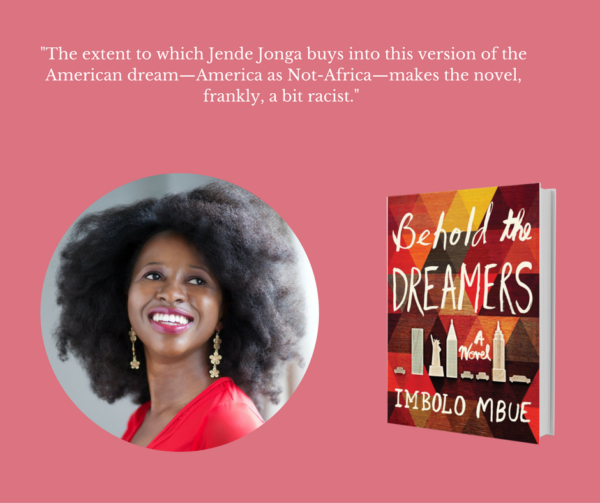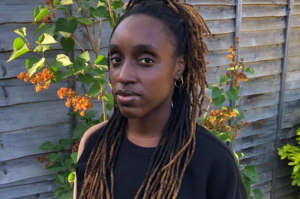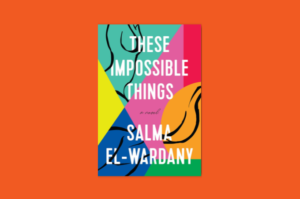American writer, Aaron Bady, has read Imbolo Mbue’s Behold the Dreamers and is’t altogether impressed. In his review published on LitHub, he expresses reservations about certain aspects of the novel’s representation of Africa and Africans.
Behold the Dreamers has been out for a few months. The novel follows the struggles of a Cameroonian man living in NYC right when the housing market crash happens.
Mbue, a Cameroonian novelist, burst into the lime light a few years ago when she landed a million-dollar publishing deal for the manuscript that became Behold the Dreamers. The novel has been out for while now, and some people are wondering whether the novel is living up to the hype built around the eye-popping publishing deal. We don’t know how well the book is selling. What we do know is that it has been a favorite among book critics. It’s been featured in major literary, fashion, and culture sites–NYT, NPR, Elle.com, Vogue.com and a host of others. The tone among these critics has been generally positive, perhaps, with a little less enthusiastic than one would have expected, but positive nonetheless.
Bady deviates from this general tone of what one might call subdued excitement and points out what he sees as problematic aspects of Mbue’s fictional world. Through a series of in-depth literary readings, Bady knocks the book for presenting both Africa and the principal African characters in slightly racist light. He writes: “The extent to which Jende Jonga buys into this version of the American dream—America as Not-Africa—makes the novel, frankly, a bit racist. To put it bluntly, it confirms and displays an uncomfortably large number of stereotypes about Africa and Africans.”
Read the rest of the excerpt below:
If you make a list of words to describe Jende Jonga, you get an image of the African as: simple, good, hopeless, ignorant, confused, earnest, happy, selfless, patriarchal, incurious, faithful, dependable, and dependent. If he is sympathetic, the depth of his pathos is matched and facilitated by his shallowness of intellect; his American dream is always, also, his totalizing self-negation as African. He is many things, but one of them is a figure of Fanonian abjection; if his is the story of the American dream, it is also the story of African self-hate.
To be clear: Jende Jonga and his wife, Neni, are rendered with sympathy and warmth, and it is their lives which concern us as readers. But they are also caricatures of the good-hearted, ignorant immigrant. Their misconceptions about America are played throughout for light comedy—as when Neni describes lingerie as the American version of love potions—and the many small confusions and humiliations which form Jende’s life as a rich man’s chauffeur never result in anything approaching resentment or hostility. His love for his employer—and the depth of his gratitude and satisfaction—is unsettling.
But maybe it’s meant to be. I don’t know. A caricature can be warm-hearted, coming from a place of sympathy and love. It can also be minstrelsy. And this is the question, the problem with the novel: is it “problematic,” or does it expose the problem with the American dream, and its exceptionalist presumptions? Without Obama’s claim that “in no other country on earth is my story even possible”—a line in his 2004 convention speech which panders to soft racism and xenophobia—would his presidency have been thinkable?
To believe in that American story—as Jende Jonga wholeheartedly does, at the beginning of the novel—one must accept its racist premise: to become a person with an American future, Jende Jonga must scrub away his African past. He must insist that America is the promised land, for which he would give anything; Africa is the bondage in Egypt from which his family must flee. And so he does. — Read full review HERE.
The review is not all negative, though. Towards the end, Bady makes a few positive observations. But, all in all, he has serious issues with the the novel. If you’ve read Behold the Dreamers, let us know your thoughts on Bady’s assessment and on the book itself.










Hannah November 04, 2016 06:54
I read the full review and I get his point, especially with the quotes from the protagonist, Jende Jonga. I think, Kasanda, you might benefit from reading the full review as well. It might shed more light on what he's tryng to say. In Bady's words: "What saves [the novel], for me, is the distance Behold the Dreamers eventually creates between its subjects and their dreams, between the dream they think they are living and the lives they ultimately wake up to. It does this through a simple act of narrative framing: we never leave the minds of the novel’s African protagonists."